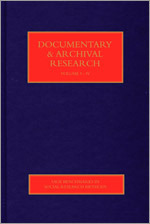Documentary & Archival Research
Four Volume Set
Edited by:
- Jason Hughes - University of Leicester, UK
- John Goodwin - Professor, School of Media, Communication and Sociology, University of Leicester
March 2014 | 1 544 pages | SAGE Publications Ltd
This research tradition has arisen from a specific set of historical, disciplinary and institutional conditions. The very emergence of 'documentation' is predicated upon a set of long-term processes in which humans have developed the capacity to use symbols and store knowledge such that it can be exchanged and inter-generationally transmitted.Consisting of an impressive list of contributors, the four volumes discuss the history, development and current debates alive in the field, such as the biographical turn in social science, the theoretical underpinnings to using human documents in social research and the epistemological, substantive and practical concerns with the process of analyzing data from human documentary sources.Comprehensive, illuminating and dynamic, this collection will have appeal across all social science disciplines, especially sociology, social psychology, criminology, politics and international relations, management and business studies, human geography, media and communication studies
Volume One: Human Documents: Perspectives and Approaches
Volume Two: Analyzing Human Documents
Volume Three: Human Documents in Social Research
Volume Four: Archival Research and Data Re-Use
Volume One: Human Documents: Perspectives and Approaches
Volume Two: Analyzing Human Documents
Volume Three: Human Documents in Social Research
Volume Four: Archival Research and Data Re-Use
VOLUME ONE: Human Documents – Perspectives and Approaches
Lindsay Prior
Herbert Blumer
Florian Znaniecki
G. Allport
Hyman Marianpolski and Dana Hughes
Liz Stanley
Ken Plummer
J. Platt
J. Platt
Tom Wengraf, Prue Chamberlayne and Joanna Bornat
M. Olssen
Ken Plummer
Norman Denzin
Brian Roberts
Brian Roberts
Ann Oakley
L. Stanley
Lindsay Prior
P. Thompson
Jon Wagner
VOLUME TWO: Analysing Human Documents
John Scott
Paul Atkinson and Amanda Coffey
Ben Gidley
Lindsay Prior
B. Berg and H. Lune
Ian Hodder
Jennifer Mason
Ralf Bohnsack
Eric Dunning
G. Rose
Hubert Knoblauch and Bernt Schnettler
B. Paltridge
Linda Wood and Rolf Kroger
Tim Rapley
Liz Stanley
G. Gibbs
Judith Sixsmith and Craig Murray
D. Beer and R. Burrows
Dhiraj Murthy
VOLUME THREE: Human Documents in Social Research
R. Burgess
Gayle Letherby and Dawn Zdrodowski
Lindsay Prior
Lindsay Prior
Judith Davidson
Rachel Thomson and Janet Holland
John Brewer
M. Keen
Andrea Salter
Jeannie Wright
J. Hislop, S. Arber, R. Meadows and S. Venn
N. Worth
E. Chaplin
Angela Bolton, Christopher Pole and Phillip Mizen
Tahneer Oksman
Ori Schwarz
Paul Longley Arthur
Elizabeth Podnieks
A. Cohn and J. Richters
VOLUME FOUR: Archival Research
G. McCulloch
Louise Corti and Paul Thompson
Clive Seale
Thomas Osborne
Mike Featherstone
Craig Robertson
Pamela Innes
N. Lerner
B. Lucas and M. Strain
Gordon Fyfe
John Goodwin and Jason Hughes
Norbert Elias
Helmut Kuzmics
E. Pike
Dorothy Sheridan
Dorothy Sheridan
Annebella Pollen
Mike Savage
Fiona Gill and Catriona Elder
Louise Corti

